LAWRENCEVILLE, Ga.—The college experience was all new to Homero Gonzalez and his family when he stepped onto the campus of Georgia Gwinnett College in 2007. It was all new to the college, too.
The first in his family to attend college, Gonzalez was also in the first freshman class to enroll at Georgia Gwinnett, which had opened its doors by admitting upperclassmen a year earlier. That first freshman class was small — 300 total—at a school that had big plans but no accreditation.
But having missed the deadline for applying to the University of Georgia, Gonzalez thought it was worth taking a chance on the school just down the road from his high school in a suburb northeast of Atlanta.
“I really felt that Georgia Gwinnett College, even though it was unaccredited, was going to be something big,” Gonzalez said.
He had already experienced the personal attention that Georgia Gwinnett pledged to extend to every student.
“We said from the beginning that we’re going to make this college about its students,” said President Stanley Preczewski (pruh-CHEFF-ski), a retired Army colonel who served as the college’s vice president for academic and student affairs from the school’s founding until he was named president in 2014. “We wanted to create an institution that wasn’t about the employees. It’s about the students we serve.”
In Gonzalez’ case, this student-centered approach became evident when he and his family visited an open house before he decided to enroll. The Gonzalez family, which had moved to Georgia from Mexico, was one of the few Hispanic families at the open house, Gonzalez said, and they didn’t know what to expect or even what to ask about college.
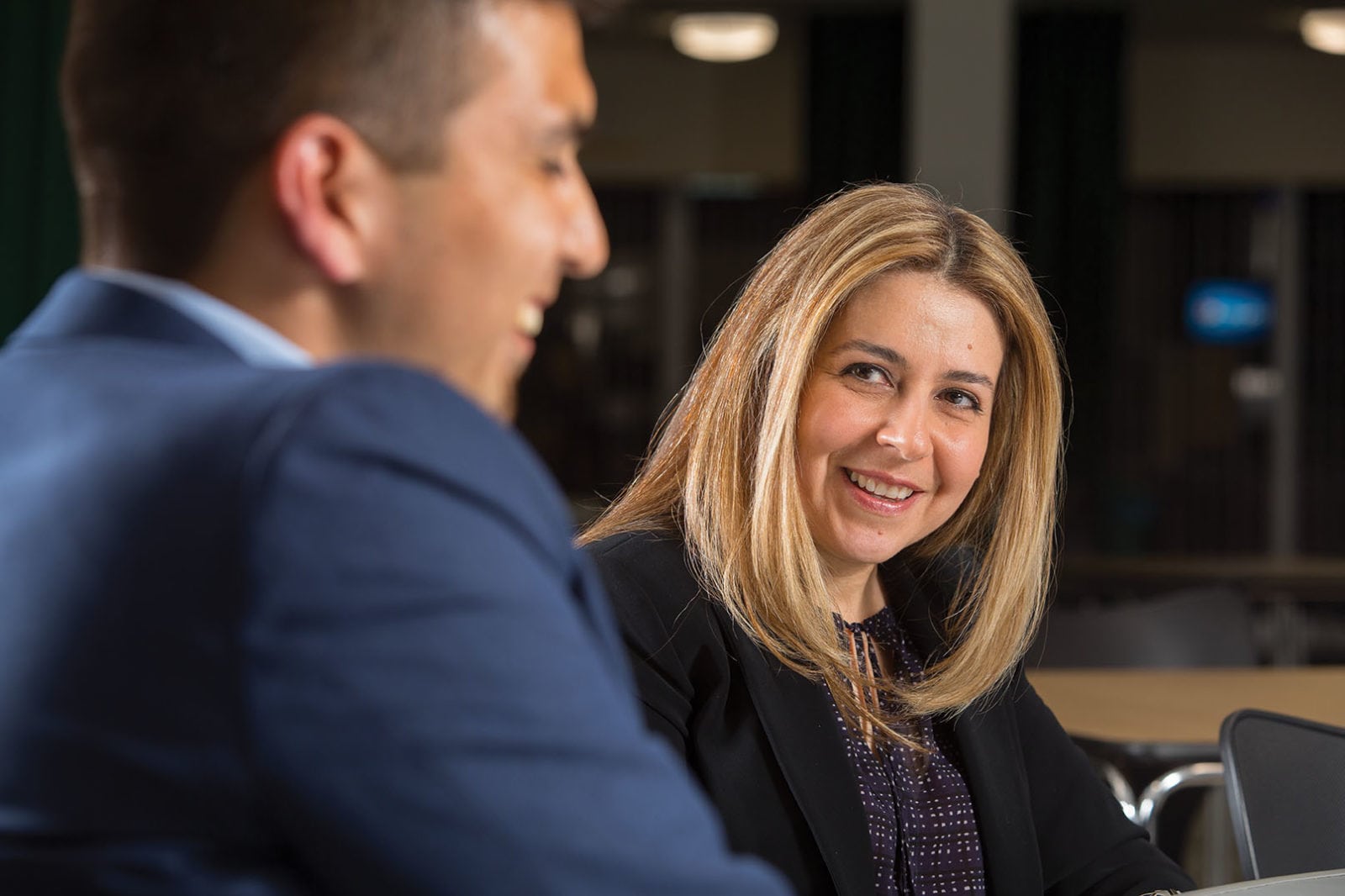
But as they were leaving the open house, the family met Jessica Damian, an English instructor originally from El Salvador. She spoke to them in Spanish and assured them that Homero belonged at Georgia Gwinnett. And she told his parents that she would take care of him.
“Meeting somebody who was willing to sit down and guide us through everything brought us peace of mind and made us think we would be OK,” said Gonzalez, now age 29. Figuratively, “the whole family was going to college. It wasn’t just me, and they had to know what they were doing.”
Damian served as faculty mentor for Gonzalez and convinced him to serve as president of an organization of Hispanic students for three years. Gonzalez also took advantage of the English Student Success course to improve his English-language skills and worked with the school’s tutoring center.
A general business major with a concentration in marketing, Gonzalez became interested in graphic design and built a portfolio doing work for student organizations. When a crew from the Spanish-language news service Telemundo came to cover the opening of the school’s new library, he served as a translator. Within weeks, during his senior year, he was hired by Telemundo.
After graduating in May 2011, Gonzalez continued with Telemundo, eventually winning 19 local Emmy awards for broadcast work he helped produce. In 2016, he started his own marketing firm.
In 2013, shortly after winning his first two Emmys, he was invited back to Georgia Gwinnett to deliver the commencement address. By then, his brothers Arnoldo and Esteban were on their way to graduating from Georgia Gwinnett, and other immigrant families from their hometown of Hualahuises, Mexico, had begun to send students to the college.
In the speech, Gonzalez paid tribute to the college’s commitment to its students and to the inspiring example set by his father, who had immigrated to the United States from Mexico at age 17. At first speaking no English, his father memorized new words by writing them on matchbooks, and eventually built a construction business that allowed him to bring the entire family to Georgia.
“You should always forge your own path and—like my father—I did,” said Gonzalez, as he proudly displayed two Emmy awards on the podium.
President Preczewski remembers the speech well.
“He spoke about what Georgia Gwinnett College did for him. He said, ‘You changed my family. You changed me. You changed my community,’” the president recalled.
A West Point connection
Damian said that commitment to the students goes back to the college’s founding and its first hires of faculty and staff.
“Our mission and our vision are still alive, and students are at the heart of this institution,” she said.
From the beginning, a group of ex-military officers brought to the school by the college’s first president established a clear mission for the college, the first four- year institution created in Georgia in more than 100 years.
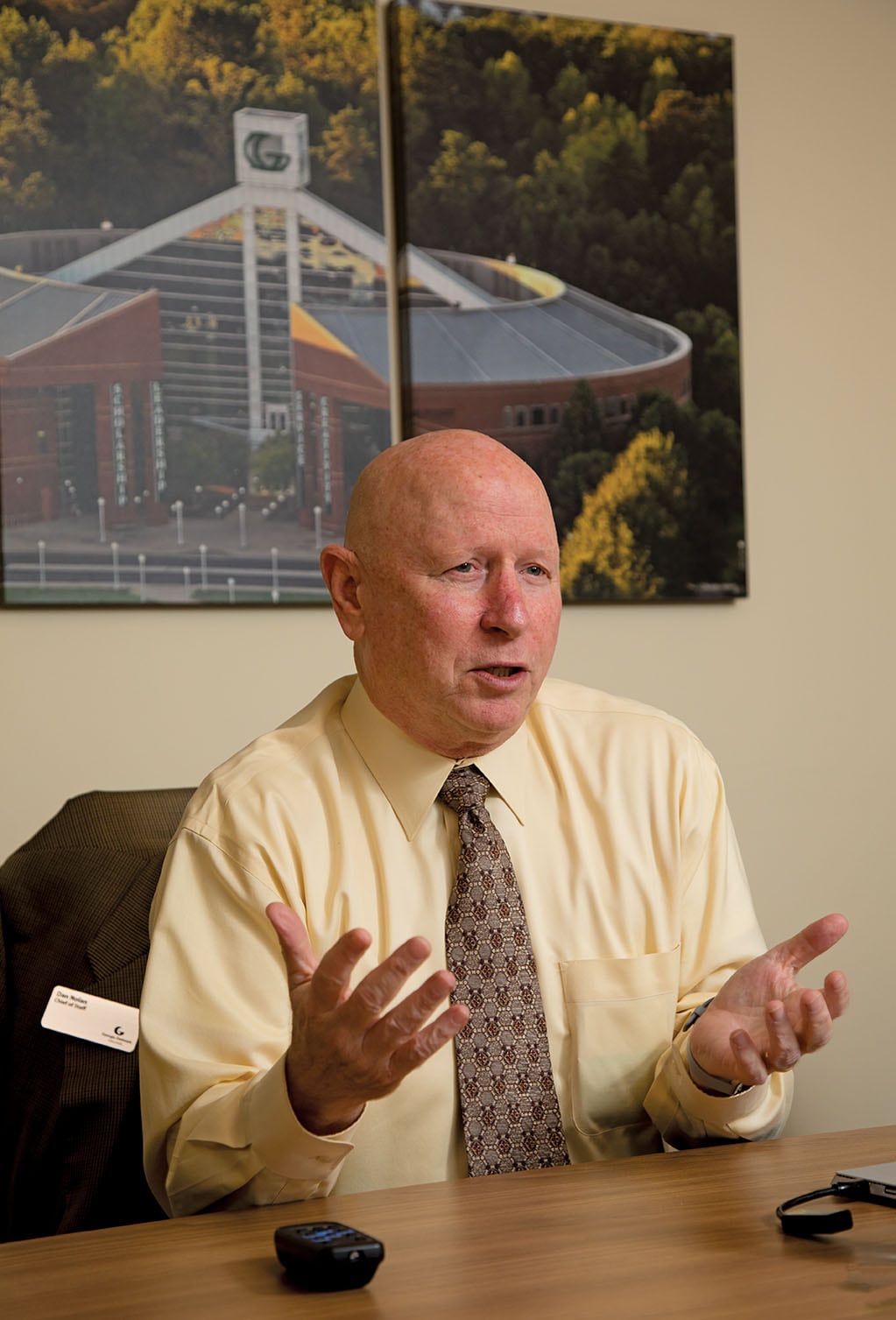
The founding president, retired Army Brig. Gen. Daniel J. Kaufman, used to say: “‘Hire quality people, pay them a very competitive salary, give them a good mission, and get the hell out of the way.’ That’s what we did,” said Preczewski, who, like Kaufman, came to Georgia from the U.S. Military Academy at West Point.
Here are the rules they and their colleagues pledged to follow at the new college:
- Ensure that all classes have no more than 28 students.
- Provide 24-7 tutoring—in classrooms, all around campus, and online.
- Assign a mentor to each student.
- Create an academic structure with no tenure and no departmental bureaucracies.
- Keep support staff lean. (Georgia Gwinnett has one support staff member for every 1.7 faculty members. Preczewski says the ratio at most Georgia colleges is 3-1.)
- Keep tuition and fees low. (Preczewski says a full Pell Grant will more than cover a typical student’s tuition and fees.)
- Make everyone on staff accessible and responsive to student needs. (Everyone on campus is given Preczewski’s cell phone number. All instructors are required to list their personal mobile phone numbers on each course syllabus. Teachers have no office hours because they’re expected to be available to students at any time.)
- Connect with students so staff and instructors can identify students’ particular needs and situations that require quick response.
- Build a safety net to meet students’ needs for things such as food, housing, transportation, and childcare — everyday challenges that can imperil college careers.
So far, it’s working, said Preczewski, known to everyone on campus by his nickname, “Stas.”
“You open up a restaurant and you serve bad food, you’re not going to stay in business very long,” he said. “We’ve gone from no students in 2006 to 13,000 students this fall. I think we must be serving a pretty good burger.
“I will not begin to say that anybody can do this,” he continued. “When you start with a clean slate, it’s a lot easier than if you have to come in and change a culture.”
Georgia Gwinnett College’s enrollment has grown every year for the last 12 years in a county, now Georgia’s second largest, that has seen its population explode from 100,000 in 1980 to nearly 1 million today. In 1980, the county population was 90 percent white. Today, there is no majority race or ethnicity. Georgia Gwinnett students come from 37 states and 126 countries.
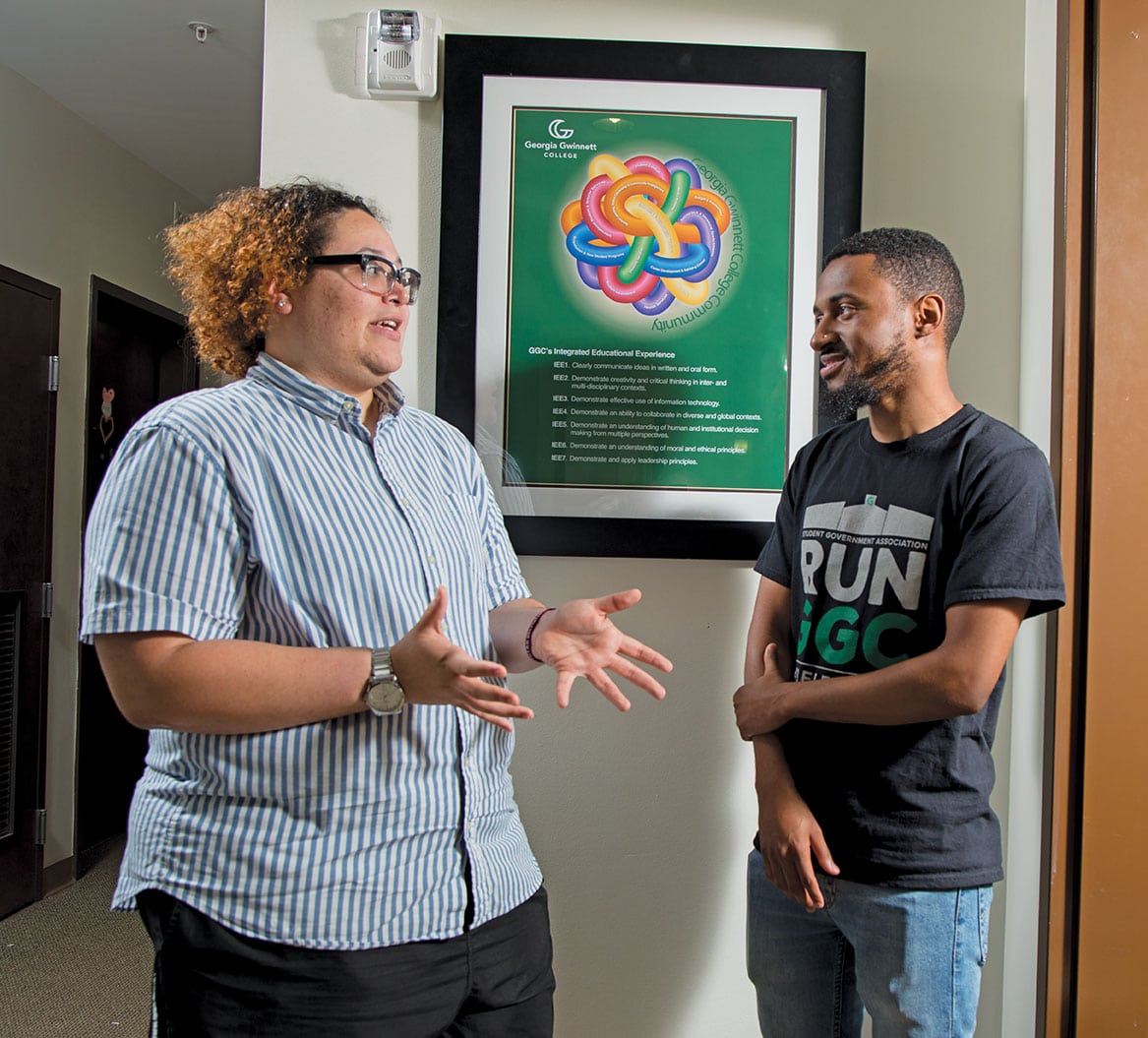
“We are the most ethnically and racially diverse college, public or private, in the entire South,” Preczewski said. “We want this college to be open to those who are first-generation college students, low-income, and minorities.”
To help students in this diverse population succeed, Georgia Gwinnett emphasizes two key points: quickly establish relationships between students and staff, and try to help students succeed at the beginning of their college experience.
“The two best predictors of whether students will graduate are, first, establishing a relationship with a staff member early on and, second, success in the first semester,” Preczewski said. “(In the first term), we strongly encourage our students to take the minimum number of classes.
We want our students to get used to it.”
But as the population has grown, so too has the college’s commitment to help students overcome non-academic barriers—the difficult stuff of daily life that can easily derail students.
“We’ve started to discover more and more students were having temporary homeless situations: sleeping in cars, students going from house to house, friends to friends, not knowing where their next night’s sleep is going to be,” said Tomas Jimenez, the college’s dean and senior associate vice president for student affairs.
Other students face food insecurity, transportation challenges, problems paying for textbooks—all obstacles that require assistance beyond traditional financial aid.
The college acts aggressively—and quickly—to address these issues. Preczewski regularly signs personal checks to leave with his assistant so she can help a student pay for a textbook or meet an emergency expense. Nearly 80 percent of the university staff give a portion of their salaries back to the university to help students in need, Preczewski said.
“We are very good at providing a safety net,” said Dan Nolan, a retired military officer who serves as the college’s chief of staff. “When bad things happen, we’ll rally very quickly. It’s in our nature: How can we serve? How can we help?”
Now, Nolan said, the challenge is to improve the college’s ability to predict the types of assistance that students will need and when they might need them. For example, he said, if a student lacks a campus parking permit, does that student have a way to get to class regularly? Is there a bus line the student could use?
“Typically, the problem is identified when the student comes in and says, ‘I just hit the wall,’” Nolan said. “We have started to ask the question, ‘Is there a way we could build a scaffolding so we don’t need as many safety nets?’”
The college is now formalizing this scaffold-building effort in a project called Grizzlies Helping Grizzlies, a name that invokes the school mascot. The project began with the student affairs staff collecting funds for cash, gift cards, and other short-term support. The college then began to identify and reach out to other local relief and support organizations that address issues such as housing, transportation, and food insecurity.
The need is real. Statistics compiled by the college show that 44 percent of students last year experienced housing insecurity, 43 percent had low or very low food security, 14 percent experienced some form of homelessness, and 7.2 percent experienced all three of these issues.
‘I am begging you …’
India Doster wanted to stay in school, so she wrote a note to the college president.
“Dear President: As of now, I am considered homeless,” she wrote to Preczewski in December 2017. “I have only one year left here at Georgia Gwinnett College. I managed to get my tuition paid for, but I cannot afford to live here on campus. … I am begging you please to help me so that I can stay here at Georgia Gwinnett College, so I don’t have to drop out. I have nowhere else to go.”
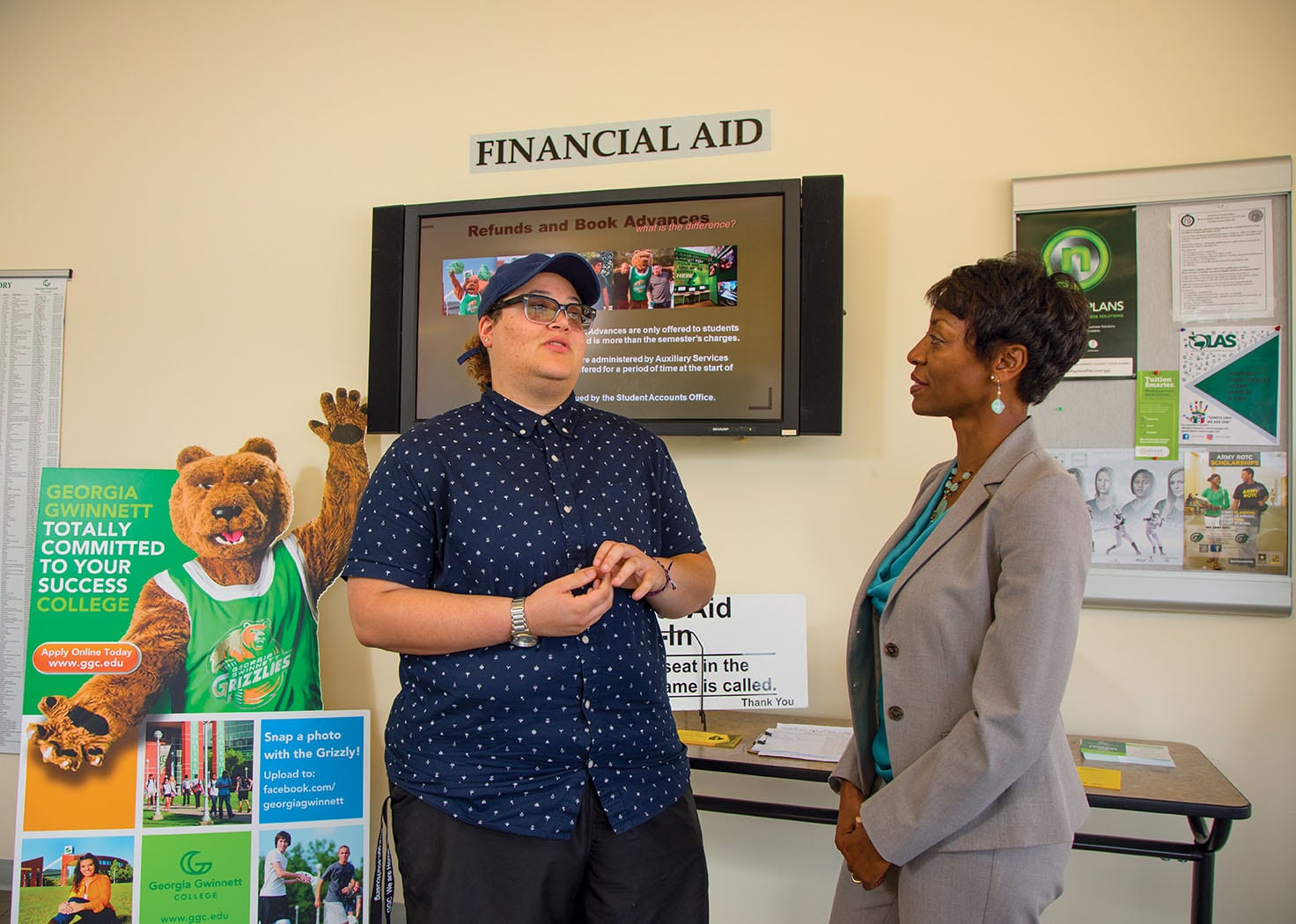
Doster, 23, had been a resident assistant at the college, a position that afforded her free housing. However, after she fell ill with ulcers, her grade-point average dropped below the 2.5 standard she needed to keep her position. She needed a place to live.
Jimenez and the financial aid office intervened quickly. They found Doster student loans and, more important, a place to stay on campus. She now works three jobs—in the housing office, as a student security guard at nights and with a food service company on campus. Most days, she works from 7 a.m. to 11 p.m. and often must stay up until 2 a.m. to finish her homework.
The hard work is paying off. She is scheduled to graduate in December 2019 with a bachelor’s degree in exercise science. At other schools, that might not have happened, she said.
“This school issues cell phones for just about everybody who works here,” Doster said. “As long as you communicate with them, they will help you do about anything.”
And often that help goes far beyond finances—as it did for Marri Brown.
In 2013, after completing high school in Decatur, Ga., Brown made a life-changing declaration.
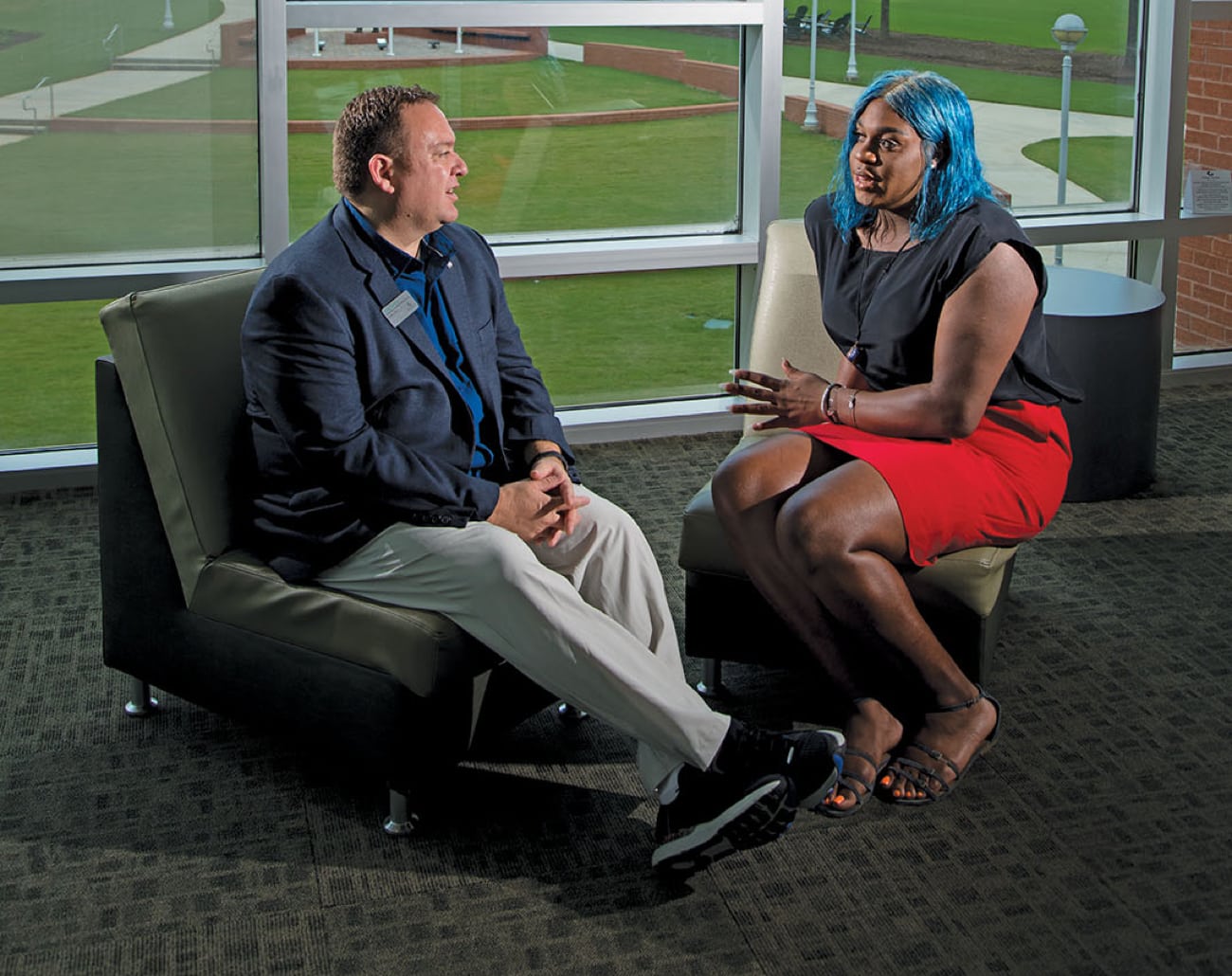
“I decided I wanted to live life as a woman, and my father didn’t agree with that,” said Brown, whose birth name was Marrius. “He basically kicked me out. It forced me to live wherever I could find (a place) to live.”
She stayed with a friend, was briefly homeless and stayed in a shelter, all while applying to college. In the spring of 2014, she enrolled at Georgia Gwinnett but had to drop out in the fall of 2016 after she lost a job and her car broke down. But a few months later, inspired by a friend’s graduation, she decided to return to school in the spring of 2017. She now is on course to graduate in December 2019 with a degree in human development and aging services.
She is active on campus, serving as president of the Black Student Union and working as a student assistant at the Student Center and Student Involvement office.
The college has helped her with food and housing. Although she had a place to live on campus when school was in session, housing wasn’t available between terms. The college has changed that policy, so transitional housing is now available when classes aren’t in session.
“Marri is a success story,” said Jimenez, the school’s dean. “She’s done an outstanding job of speaking up. She’s very brave. She’s very courageous.
“Her story is sometimes difficult to tell, but it’s a story that needs to be told,” Jimenez said. “So, when she stepped up and really let some people know what her story is, it was easy for people here and the culture here to assist her.”
After she graduates, Brown, 23, is considering creating a nonprofit to help transgender people. She said she would model it after the Grizzlies Helping Grizzlies program that has assisted her.
“I’m actually thankful I made the choice” to attend Georgia Gwinnett, she said. If she had gone elsewhere, “I wouldn’t be where I am today. I probably would be the same person my dad wanted me to be.”
